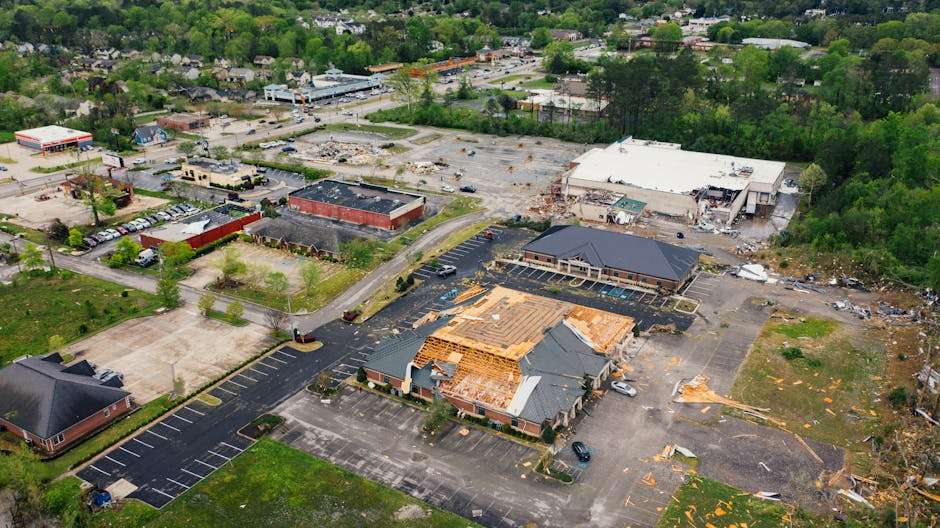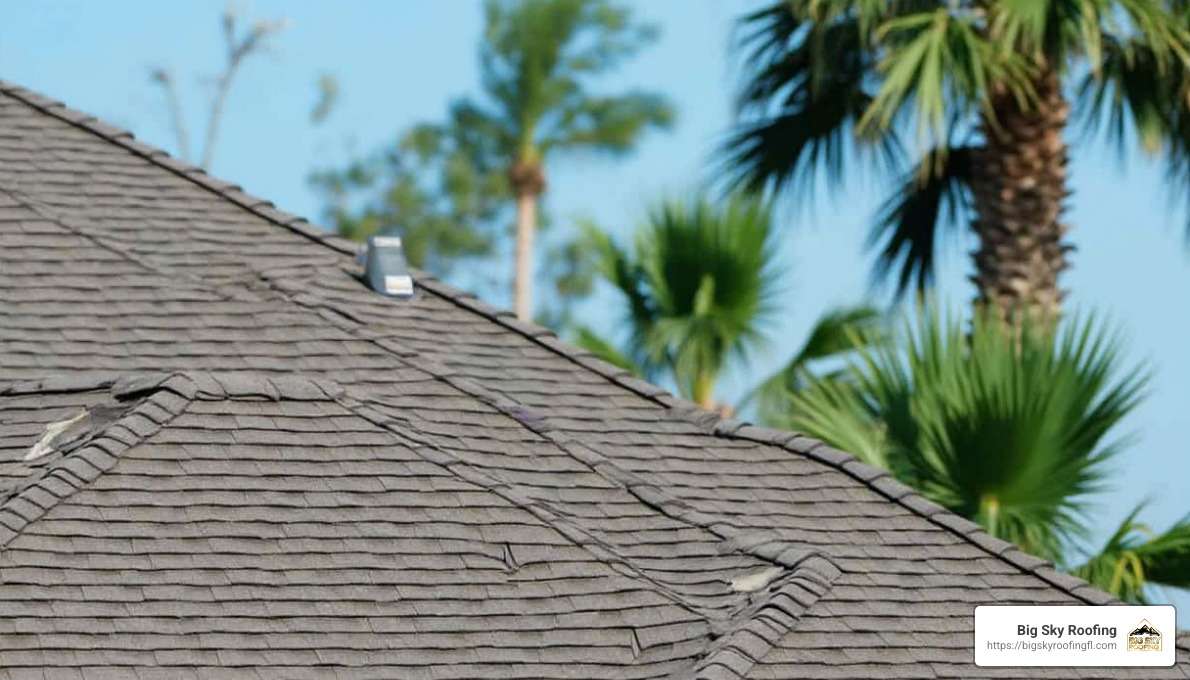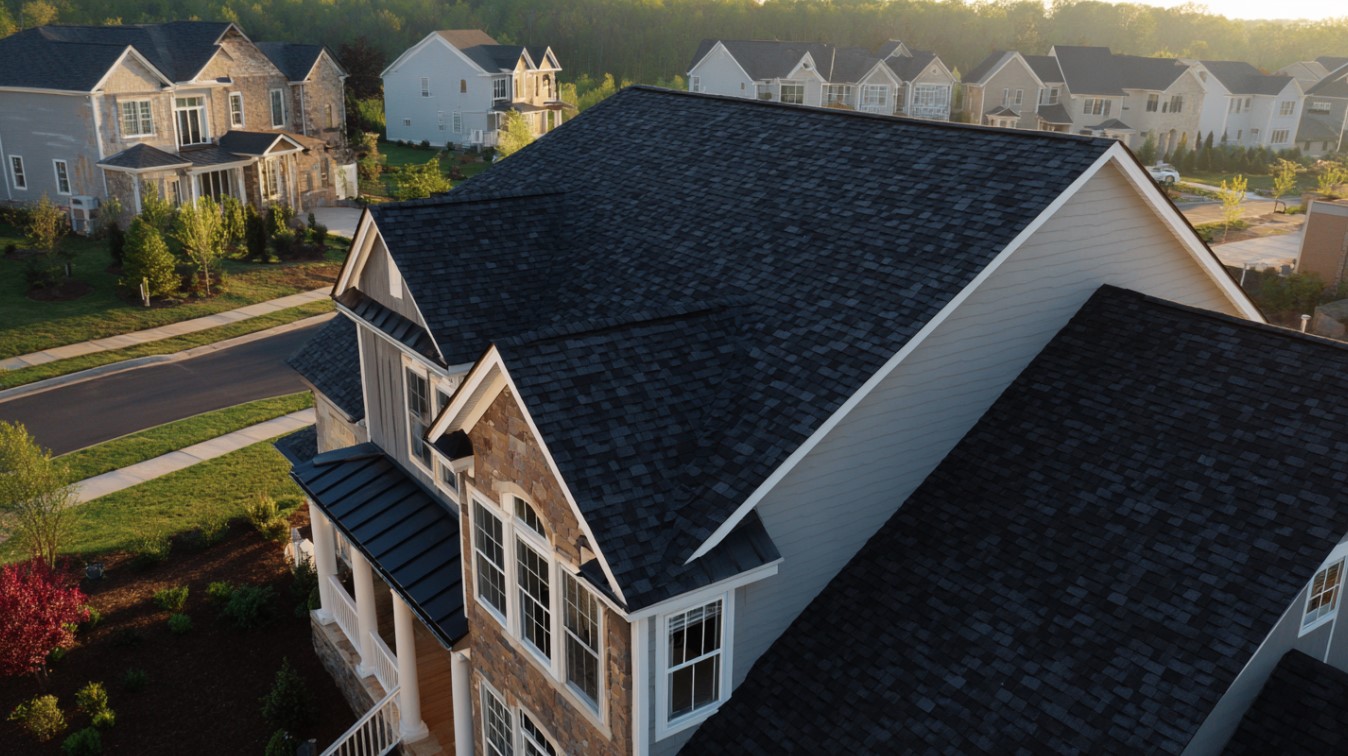From Novice to Certified: Florida Roofing Contractor Pathway
•
Written By

Certified roofing contractor florida is a term buzzing among many Florida homeowners, especially given the state’s unpredictable weather patterns which often result in roof damage. If you’re wondering how one becomes a certified roofing contractor in Florida, here’s what you need to know:
- Licensing Requirements: Florida mandates that aspiring roofing contractors hold a Certified Roofing Contractor license, allowing them to operate anywhere in the state.
- Experience: Prior to applying, one must have 4 years of experience in the roofing trade, including at least 1 year in a supervisory role.
- Examinations: Candidates must pass the Florida Business and Finance Exam and the Roofing Exam to demonstrate their knowledge.
Florida’s unique climate demands reliable, well-skilled roofing professionals. For homeowners concerned about frequent weather-related damage and rising repair costs, selecting a certified roofing contractor provides assurance of expertise and adherence to the Florida Building Code.
Big Sky Roofing operates in key Florida counties like Sumter, Lake, Citrus, Hernando, Orange, and Marion, offering top-notch roofing solutions. Ensuring your home is safeguarded starts with understanding the rigors of becoming and selecting a certified roofing contractor florida.
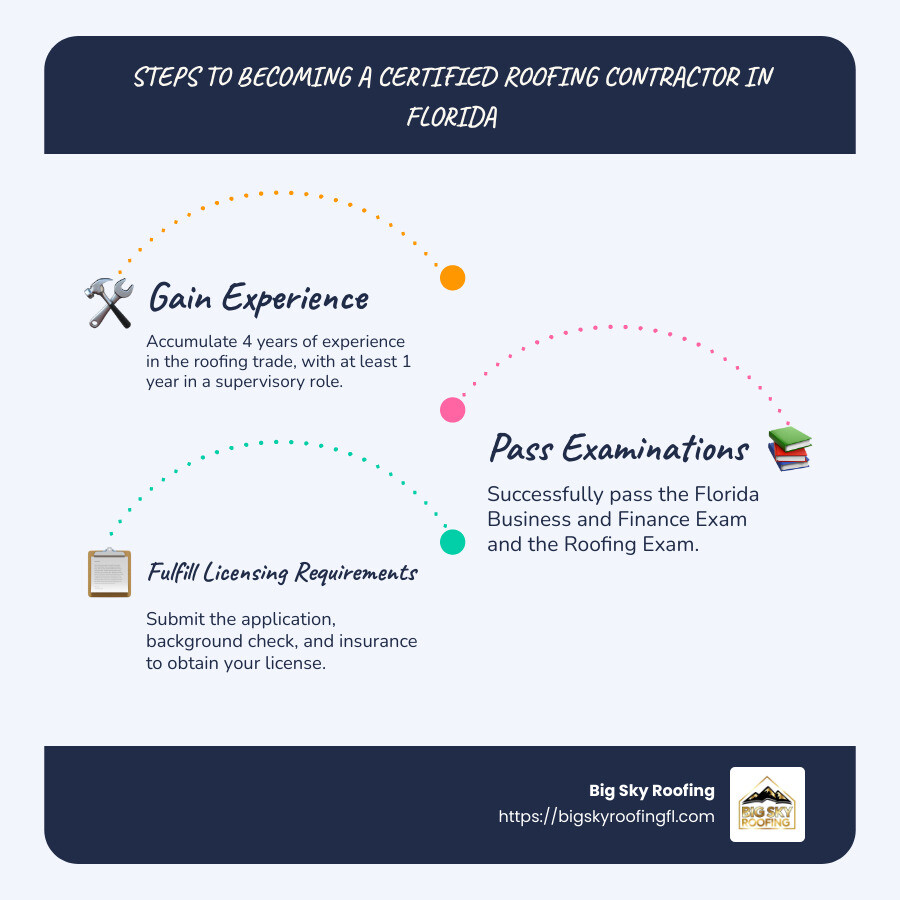
Easy certified roofing contractor florida glossary:
– are roofers required to be licensed in florida
– how to get a roofers license in florida
Understanding the Role of a Certified Roofing Contractor
A certified roofing contractor in Florida is more than just a person who fixes roofs. They are skilled professionals with the expertise needed to tackle a wide range of roofing tasks, from installation to maintenance and repair. Their work is critical, especially in a state like Florida, where the weather can be harsh and unpredictable.
Roofing Services
Certified roofing contractors offer a variety of services that include:
- Installation: Whether it’s a new home or a renovation, these contractors ensure that the roof is installed correctly and meets all safety standards.
- Maintenance: Regular maintenance is essential to prolong the life of a roof. This includes cleaning, inspecting for damage, and replacing any faulty parts.
- Repair: After a storm or due to wear and tear, certified contractors can repair leaks, replace shingles, and fix structural damage.
Skills and Experience
To achieve certification, contractors must demonstrate a high level of skill and experience. This includes:
- Hands-on Experience: Contractors need at least four years of experience in the roofing trade, with one year in a supervisory role. This ensures they have the practical knowledge to handle complex roofing challenges.
- Knowledge of the Florida Building Code: This is crucial. The Florida Building Code sets the standards for construction and safety. Certified contractors must know these regulations inside out to ensure all work complies with state laws.
Florida Building Code
The Florida Building Code is a set of regulations that dictate how buildings should be constructed and maintained. It covers everything from structural integrity to energy efficiency. Certified roofing contractors must adhere to these standards to ensure the safety and durability of the roofs they work on.
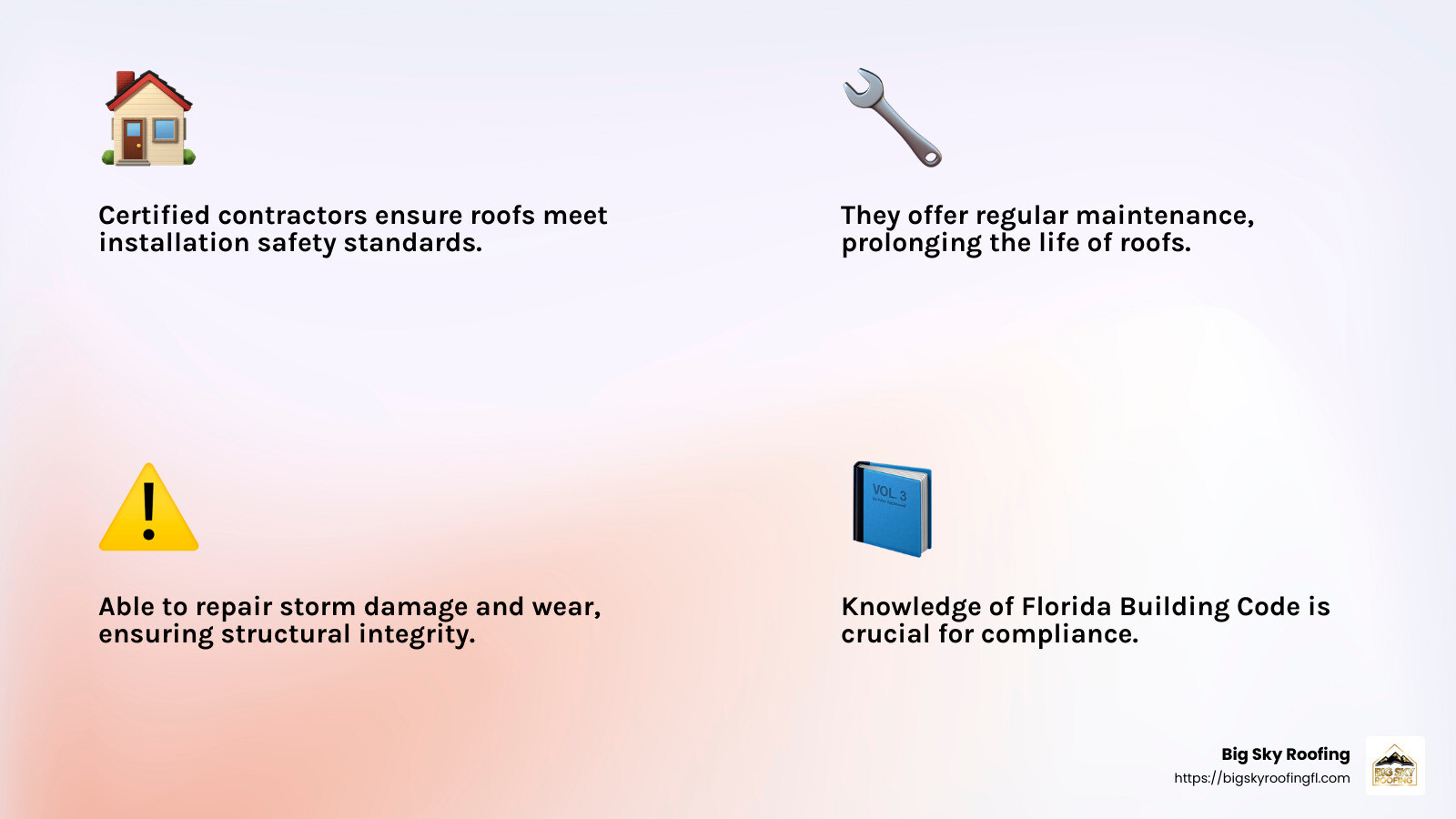
For homeowners in counties like Sumter, Lake, Citrus, Hernando, Orange, and Marion, hiring a certified roofing contractor from Big Sky Roofing means peace of mind. It ensures that the work is done by professionals who are not only skilled but also compliant with all legal and safety standards.
Next, we’ll dig into the steps to becoming a certified roofing contractor in Florida, starting with the examination process.
Steps to Becoming a Certified Roofing Contractor in Florida
Becoming a certified roofing contractor in Florida involves several key steps. Let’s break them down:
Examination Process
First up, examinations. To get certified, you must pass two important tests: the Roofing Trade Knowledge Exam and the Business & Finance Exam.
- Roofing Trade Knowledge Exam: This is an 80-question test that covers everything from built-up roofs to shingles and shakes. You’ll need to know about different roofing systems, safety, and equipment. It’s an open-book exam, so you can refer to your materials, but you’ll still need to study hard.
- Business & Finance Exam: This 120-question exam tests your knowledge on running a business, managing finances, and understanding government regulations. You’ll need to know how to handle contracts, accounting, and human resources.
Both exams are computer-based and require a lot of preparation. The total fee for these exams is $295.
Application Requirements
Next, let’s talk about the application requirements.
- Initial Licensure: Once you’ve passed the exams, you can apply for your license. You’ll need to fill out an application form and meet several criteria.
- Age Requirement: You must be at least 18 years old to apply.
- Military Veterans: If you’re a veteran, there are special pathways to licensure. Your military service can count towards your experience requirement, making the process a bit easier.
Experience and Education
Experience and education are crucial parts of becoming a certified roofing contractor.
- Four Years Experience: You need at least four years of experience in the roofing trade. This includes one year in a supervisory role. If you have a construction-related degree, it can count as three years of experience.
- College Credits: If you don’t have a degree, you can also fulfill the experience requirement with a mix of work experience and college credits. Options include one year as a foreman and three years of college credits, or two years as a worker, one year as a foreman, and one year of college credits.
- Military Service: Veterans can combine their military service with work experience to meet the requirements. For example, three years of military service plus one year as a foreman can qualify you.
Financial and Legal Considerations
Lastly, there are some financial and legal considerations.
- Financial Stability: You must prove your financial stability by providing a credit report. If your credit score is below 660, you might need to submit a bond or take a financial responsibility course.
- Fingerprints: A background check is required, which involves submitting your fingerprints.
- Insurance: You need to have public liability and property damage insurance. You also need workers’ compensation insurance or an exemption within 30 days of getting your license.
These steps might seem daunting, but they ensure that only qualified professionals become certified roofing contractors in Florida. Once you’ve completed these steps, you’re ready to apply for your license and start your career!
Next, we’ll explore the financial and legal considerations in more detail.
Financial and Legal Considerations
When pursuing a career as a certified roofing contractor in Florida, understanding the financial and legal aspects is crucial. These considerations ensure that you meet the state’s standards and protect your business and clients. Let’s explore the key elements.
Financial Stability
To demonstrate financial responsibility, you must provide a consumer credit report. A credit score of at least 660 is required. If your score falls below this threshold, you might need to secure a $10,000 licensing bond or complete a 14-hour financial responsibility course. This ensures that you have the financial backing to handle potential liabilities.
Credit Reports
Your credit report plays a significant role in the licensing process. It should show a clean record, free from unpaid liens, suits, or judgments. This is crucial because a poor credit history can delay your application or require additional steps, such as obtaining a letter of credit from a bank.
Background Check
Florida mandates a Level 2 background check for all applicants. This includes fingerprinting and a thorough review of your criminal history. The state wants to ensure that applicants are of good moral character. If there are any issues, you must provide detailed documentation, which can slow down the process.
Public Liability Insurance
Insurance is a non-negotiable part of becoming a certified roofing contractor. You’ll need:
- Public Liability Insurance: At least $100,000 in coverage.
- Property Damage Insurance: A minimum of $25,000 in coverage.
- Workers’ Compensation Insurance: Required unless you obtain an exemption within 30 days of licensure.
These insurance requirements protect both you and your clients from potential mishaps during roofing projects.
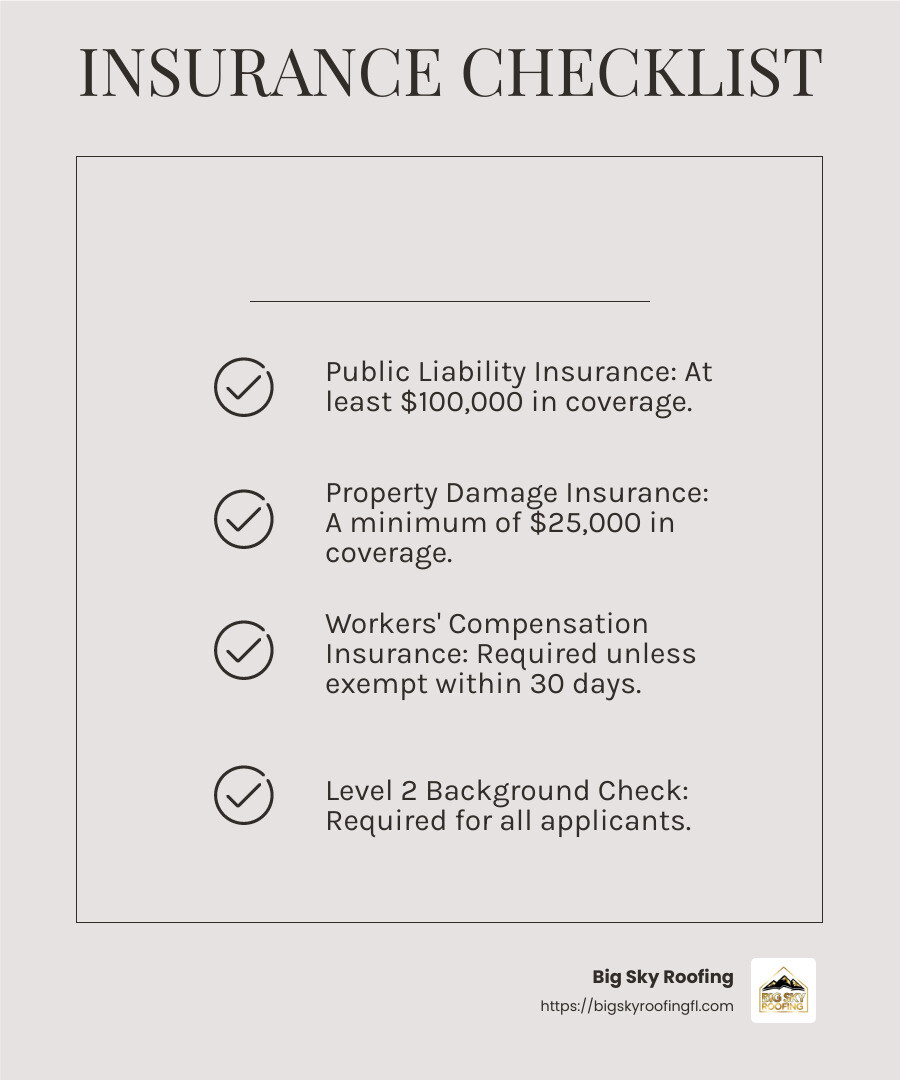
Meeting these financial and legal requirements ensures that you are fully prepared to operate as a certified roofing contractor in Florida. It demonstrates your commitment to professionalism and reliability, essential traits for success in the roofing industry.
Next, we’ll address some frequently asked questions about being a certified roofing contractor in Florida.
Frequently Asked Questions about Certified Roofing Contractor Florida
What can a certified roofing contractor do in Florida?
A certified roofing contractor in Florida has a broad range of responsibilities. They can install, maintain, repair, alter, and extend roofing systems. This includes working on all types of roofing, waterproofing, and coating, except when coatings are not intended to protect or extend the life of the roof.
Certified contractors can also handle related work such as skylights, roof-deck attachments, and the repair or replacement of wood roof sheathing or fascia. They are authorized to pull building permits and conduct inspections, ensuring that all work complies with the Florida Building Code. This code sets the standards for construction to ensure safety and durability, especially important in hurricane-prone Florida.
Who can certify a roof in Florida?
In Florida, a roof can be certified by a licensed contractor or a home inspector. A licensed roofing contractor is typically the professional who conducts the certification because they have specific expertise in roofing systems. They ensure the roof meets all safety and building codes, providing peace of mind to homeowners that their roof is up to standard.
Home inspectors can also certify roofs, often during the process of a home sale. They assess the roof’s condition and provide a report that can be used for insurance or sale purposes. However, for extensive repairs or installations, a licensed roofing contractor’s certification is usually required.
What is a CCC license in Florida?
A CCC license in Florida stands for a Certified Roofing Contractor license. This license allows contractors to work throughout the state without needing to register in each county or city individually. It provides the freedom to respond quickly to areas affected by severe weather, a common occurrence in Florida.
The CCC license ensures that contractors are knowledgeable about the Florida Building Code and adhere to the state’s strict standards for roofing work. This includes compliance with the roof replacement rule, which mandates that any roof replacements meet current building codes to improve safety and resilience against extreme weather.
In summary, a CCC license is essential for any roofing contractor aiming to operate at a high level across Florida, ensuring they deliver quality workmanship that stands up to the state’s challenging climate.
Conclusion
At Big Sky Roofing, we take pride in our commitment to superior craftsmanship and outstanding customer service across Central Florida. With over 25 years of experience, we understand the unique challenges and opportunities that come with being a certified roofing contractor in this region. Our team is dedicated to delivering high-quality roofing solutions that meet the stringent requirements of the Florida Building Code, ensuring safety and longevity for every project.
Our focus is on providing comprehensive roofing services, from repair and restoration to complete replacements. We serve a wide area, including Sumter County, Lake County, Citrus County, Hernando County, Orange County, and Marion County. By choosing Big Sky Roofing, you’re opting for a partner who values transparency, reliability, and excellence in every aspect of our work.
We believe in building lasting relationships with our clients through honest communication and custom solutions. Whether you’re dealing with storm damage or planning a new installation, our team is ready to assist with expertise and care.
We invite you to learn more about our services and how we can help you protect your home with a roof that stands the test of time. Visit our Services Page to explore our offerings and schedule a free estimate today.
Because at Big Sky Roofing, your peace of mind is our top priority.

